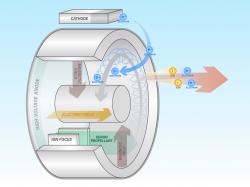 One of the main problems with spacecraft is the cost to get them into orbit. For every kilogram you can shave off their weight, you get additional cost savings in launch expenses. A team of researchers from Georgia Tech think they have a solution to help spacecraft operate with 40% less fuel.
One of the main problems with spacecraft is the cost to get them into orbit. For every kilogram you can shave off their weight, you get additional cost savings in launch expenses. A team of researchers from Georgia Tech think they have a solution to help spacecraft operate with 40% less fuel.
The technology is similar to the successful ion engines that powered NASA’s Deep Space 1 and ESA’s SMART-1 spacecraft. Solar power is used to generate an electric field that fires ions out at high velocities. It doesn’t provide a lot of thrust, but it can run for weeks or months, accelerating a spacecraft to enormous speed.
The Georgia Tech design would allow operators to adjust the spacecraft’s exhaust velocity depending on its requirements. It would run at maximum acceleration during orbit transfers, but then conserve fuel during other times.
They say they’re still years away from commercial applications, though.
Original Source: Georgia Tech News Release
